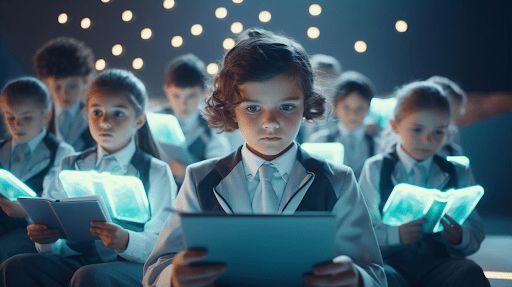Personalized Learning: AI algorithms can analyze students’ learning patterns, strengths, and weaknesses to create personalized learning paths. This ensures that each student receives individualized instruction tailored to their needs, leading to improved learning outcomes.

Adaptive Learning Platforms: AI-powered adaptive learning platforms adjust the difficulty level of content in real-time based on students’ performance. This allows students to progress at their own pace and receive immediate feedback, enhancing their understanding and retention of the material.
Intelligent Tutoring Systems: AI-driven tutoring systems provide students with personalized support and guidance, simulating one-on-one interaction with a human tutor. These systems can answer questions, provide explanations, and offer additional resources to help students master challenging concepts.
Data Analytics for Student Performance: AI tools can analyze vast amounts of data on student performance to identify trends, predict outcomes, and recommend interventions. Educators can use these insights to tailor their teaching strategies, identify struggling students early on, and provide targeted support.

Automated Grading and Feedback: AI algorithms can automate the grading of assignments, quizzes, and exams, saving educators valuable time. Additionally, AI-powered feedback systems can provide students with instant feedback on their work, helping them understand their mistakes and improve their performance.
Language Learning: AI-powered language learning platforms use natural language processing (NLP) algorithms to help students practice speaking, listening, reading, and writing in a foreign language. These platforms can provide interactive exercises, pronunciation feedback, and conversation practice, making language learning more engaging and effective.
Virtual Reality and Simulations: AI-driven virtual reality (VR) and simulations create immersive learning experiences that allow students to explore complex concepts in a hands-on way. Whether it’s dissecting a virtual frog or exploring the solar system, these interactive tools enhance students’ understanding and engagement.

Accessibility: AI technologies such as speech recognition, text-to-speech, and optical character recognition (OCR) make educational content more accessible to students with disabilities. These tools enable students with visual, auditory, or physical impairments to participate fully in the learning process.

Overall, AI holds great promise for revolutionizing education by making learning more personalized, adaptive, and inclusive. As these technologies continue to evolve, they have the potential to transform the way we teach and learn in the 21st century.

